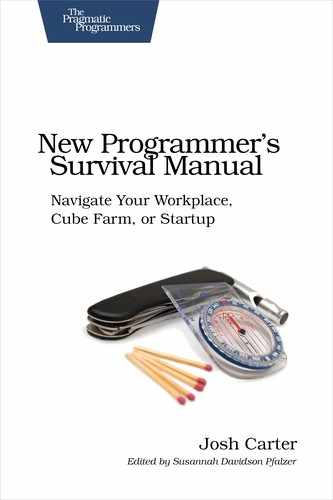| Tip 17 | Be Visible |
 | [Brown Belt] You need to start with simply doing your job well. Then you move onto getting noticed for it. |
Whatever role you have, you need to establish a positive reputation. That reputation magnifies the visibility of your role. Visibility is when people around the office know your name—“I’ve heard of Emma; she does awesome work.” Not only does it stroke your ego, but it gives you influence to get the projects and roles you want down the road.
Visibility doesn’t require a fancy job title; it’s far more subtle. You, as a lowly programmer on the bottom of the org chart, can have visibility all the way up to the CEO. If you’re working on a project the CEO has personal interest in, you have visibility. You could have stumbled into it by accident; this happened to me when I overhauled the user interface graphics for a product I was working on. The graphics were simply a hobby, not really part of my job, but the CEO loved the new look, and I was in.
You don’t always get visibility by accident, yet pushing for visibility can backfire. It’s something of a zen thing—people who overtly seek it come off looking like phonies. You know that guy in meetings who’s always piping up just so he gets a word in and sounds smart, but really he sounds like a meathead instead? Don’t be that guy.
The better approach is to let your work do the talking. First, while you’re new in your programming job, strive to get some early wins. If you have any say in the matter, take on some tasks that you know you can deliver quickly and solidly. Follow the company coding style perfectly, write unit tests that prove functionality, and make it really good and deliver fast.
Your manager will notice, and he’ll go bragging to his manager about making a good hire. “Our new programmer Emma has been here only a month, and her code went into test with zero defects. Clearly I’m a genius for hiring her.” (OK, that’s a little bit of an exaggeration, but only a little.)
Second, make a mark on the product where others will notice. Let’s say you get stuck on bug patrol—a common new-hire task, purportedly to help you “learn the code base,” but really it’s because the other programmers just don’t want to fix the bugs themselves. Your first task is to fix some GUI text fields that don’t validate correctly. Do that and check it in, and then go through and make sure the GUI widgets line up right—do some visual housekeeping that makes the interface look nicer than you found it. “Emma went through and polished this part of the GUI, and wow, it looks a lot better!”
Finally, as you get more credibility in the group and freedom to pick your tasks, pick some things that people in the company are passionate about. It could be as simple as tying a couple features together in a novel way, like adding an email gateway to a web application. “Emma made it so I can email an update to the tracking system without having to log in—what a great idea!” There’s always some itch that people have wanted to scratch but haven’t put in the effort.
Visibility may sound like shameless self-promotion. Yes, to a degree it is. But when the next job opening comes up or the next cool project is getting started, don’t you want a shot? If your name has been circulating among the managers because of something cool you did, you’re much more likely to get that shot.
And let’s be honest, programmers love to build cool stuff. When you’ve built something cool, it’s really fun to show it off. So, show it off and enjoy your moment in the spotlight.
Actions
Consider the work you have on your plate. Are there opportunities for early wins? Grab some tasks and truly nail them.
Looking ahead, can you make a dent in your product in a way that others will notice? It may be a shiny new feature, but it could also be fixing an annoying bug, too.
